Suchergebnisse
Ergebnisband „Urbane Wärme und Kälte“
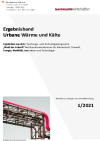
Der vorliegende Ergebnisband stellt abgeschlossene Projekte aus dem Forschungs- und Technologieprogramm „Stadt der Zukunft“ des Bundesministeriums für Klimaschutz, Umwelt, Energie, Mobilität, Innovation und Technologie (BMK) im Bereich Urbane Wärme und Kälte vor. Die gewonnenen Erkenntnisse sollen eine Entwicklung in Richtung energieeffiziente und klimaverträgliche Stadt unterstützen, die auch dazu beiträgt, die Lebensqualität und die wirtschaftliche Standortattraktivität zu erhöhen.
Schriftenreihe
1/2021
Redaktionelle Gestaltung: Bianca Pfefferer, Hannes Warmuth (ÖGUT)
Herausgeber: BMK
Deutsch, 24 Seiten
Downloads zur Publikation
Pioneering Austrian Cities
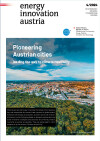
Pioneering Austrian cities leading the way to climate neutrality.
energy innovation austria
4/2024
Herausgeber: BMK in cooperation with the Climate and Energy Fund
Englisch, 12 Seiten
Downloads zur Publikation
Grüne und resiliente Stadt - Steuerungs- und Planungsinstrumente für eine klimasensible Stadtentwicklung
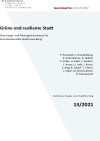
Ziel des Projekts war ein „Proof of Concept“ eines Regelkreises und Tool-Sets zur Steuerung, Optimierung und Evaluierung einer grünen und klimasensiblen Stadt(teil)planung bestehend aus städtebaulichen und freiraumplanerischen Instrumenten sowie Klimasimulationen auf unterschiedlichen Maßstabsebene.
Schriftenreihe
13/2021
F. Reinwald, C. Brandenburg, P. Hinterkörner, B. Hollósi, C. Huber, A. Kainz, J. Kastner, F. Kraus, U. Liebl, J. Preiss, Z. Ring, B. Scharf, T. Tötzer, J. Züger, M. Žuvela-Aloise, D. Damyanovic
Herausgeber: BMK
Deutsch, 124 Seiten
Downloads zur Publikation
Green SandboxBuilder: Regulatory Sandboxes im Bereich des nachhaltigen Bauens und Sanierens
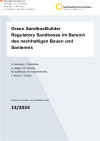
Im Projekt "Green SandboxBuilder" wurde erstmals in Österreich der Bedarf an Regulatory Sandboxes für ökologisch nachhaltige und klimawirksame Vorhaben im Baubereich systematisch erhoben. Die Umsetzung von Regulatory Sandboxes im österreichischen Bausektor kann dazu beitragen, die Einführung von technologischen, prozessualen und sozialen Innovationen entscheidend zu beschleunigen und somit die Nachhaltigkeitsziele zu erreichen.
Schriftenreihe
13/2024
G. Leimüller, J. Rohrhofer, A. Gerger, Ch. Schranz, M. Aichholzer, M. Schachenhofer, C. Benes, F. Ozclon
Herausgeber: BMK
Deutsch, 71 Seiten
Downloads zur Publikation
Green Energy Lab Insight Talk: Nachhaltiges Sanieren und Bauen von Gebäuden & Quartieren als tragende Säule der Wärmewende
21. Jänner 2025, 14:30 - 16:00 Uhr
Online
Die Energiewende ist vor allem eine Wärmewende. Beim Insight Talk werden innovative Technologien für ein nachhaltiges Bauen und Sanieren mit Fokus auf die Wärme- und Kälteversorgung vorgestellt.
Monitoringprojekt „Gebäude als Speicher“. Einfamilienhaus H. (Wind) und Einfamilienhaus F. (Solar)
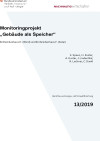
Monitoring und Vergleich der Leistungsfähigkeit der Thermischen Bauteilaktivierung in zwei bauähnlichen, bewohnten Einfamilienhäusern mit unterschiedlichen Energiequellen (Windstrom bzw. Solarenergie). Zentrales Anliegen ist es, die Funktionalität der Energieversorgung durch Wind- bzw. Photovoltaikstrom in Verbindung mit einem thermischen Speicher zu untersuchen. Die Ergebnisse liefern Erkenntnisse hinsichtlich Berechnungsannahmen, Anlagensteuerung sowie Umsetzbarkeit eines Smart-Grids.
Schriftenreihe
13/2019
S. Spaun, H. Kuster, A. Kuster, J. Lindenthal, R. Lechner, C. Dankl
Herausgeber: BMVIT
Deutsch, 53 Seiten
Downloads zur Publikation
BIMaterial Process Design for Material Building Pass
Building Information Modelling supported compilation of a Material Building Pass; as a qualitative and quantitative documentation of the material composition of, and the material distribution within, a building structure. This project is a central milestone towards standardized, BIM-generated building material passes.
Digitale Transformation der österreichischen Bauwirtschaft und Auswirkungen auf die Erwerbstätigen
In einer Trendanalyse werden wahrscheinliche Auswirkungen der digitalen Transformation in der österreichischen Bauwirtschaft auf den Branchen-Arbeitsmarkt untersucht. Auf Basis von Feedback von BranchenexpertInnen wird für die kommenden fünf bis zehn Jahre analysiert, für welche Berufsgruppen digitalisierungsinduzierte Effekte eher zu einer steigenden vs. sinkenden Arbeitskraftnachfrage führen.
Themenworkshop: Klimaneutrale Stadt – von der Forschung in die Umsetzung
18. Mai 2022
Tabakfabrik Linz, Peter-Behrens-Platz 7-8, 4020 Linz und online
Am 18. Mai fand auf Einladung des BMK und des Klima- und Energiefonds im Rahmen der Mission Innovation Austria Week 2022 der Workshop „Klimaneutrale Stadt“ in der Tabakfabrik Linz statt. Vorgestellt und diskutiert wurden konkrete Forschungs- und Umsetzungsprojekte aus „Stadt der Zukunft“ und der Smart Cities Initiative, die einen Beitrag zur Entwicklung klimaneutraler und resilienter Städte leisten.
Anforderungen an die Kreislauffähigkeit von Massivbaustoffen
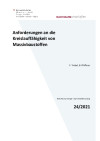
Die Studie zeigt aktuelle Herausforderungen, Chancen und Potenziale in Bezug auf die Kreislauffähigkeit der Massivbauindustrie sowie die mit ihr agierenden Akteur:innen auf. Darauf aufbauend wurden zukünftige Aktionsfelder notwendiger Forschung und Entwicklung zur Förderung der Kreislaufwirtschaft im Bereich mineralsicher Baustoffe herausgearbeitet.
Schriftenreihe
24/2021
F. Trebut, B. Pfefferer
Herausgeber: BMK
Deutsch, 59 Seiten
Downloads zur Publikation
HEROES - Häuser für Energie und RessOurcenEffiziente Siedlungen
Ein vereinfachtes Verfahren für die Berechnung von ökologischen Kennzahlen für bisher nicht betrachtete Gebäudeteile (thermisch nicht relevante Bauteile und Haustechnikkomponenten) wird entwickelt. Die methodischen Grundlagen für die Berechnung der Primärenergie u. der CO2-Emissionen im Betrieb und in den verbauten Materialien werden harmonisiert.
SOFC4City - SOFC-waste heat utilization for buildings and industry
In this project the application of a solid oxide fuel cell (SOFC) for energy supply (heat and power) of urban areas will be investigated. Due to the high temperature level of the produced heat it would be possible to use this heat for the energy supply of different heat and power consumers (residential buildings, industrial plants, etc.). One aim is to provide the SOFC-heat at several temperature levels in order to establish the advantages of the fuel cell. On the one hand the legal and market-based conditions will be evaluated, on the other hand the technological feasibility will be scoured by the use of CFD-simulation of the heat production.
Programmmanagement und Kommunikation in der missionsorientierten Forschungsförderung
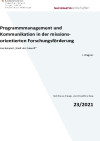
Diese Studie stellt sich die Frage, wie Programmmanagement und Wissenskommunikation in der missionsorientierten, angewandten Forschung konzipiert und effektiv umgesetzt werden können. Mittels Literatur- und Dokumentenanalyse, Stakeholderanalyse, internationaler Fallstudien, Interviews, Fokusgruppen sowie einem Co-Creationworkshop wurden Rückschlüsse auf die aktuelle Wirkung der Kommunikationsdimensionen des Programmes "Stadt der Zukunft" gezogen und Überlegungen hinsichtlich der Weiterentwicklungsmöglichkeiten zu Missionsorientierung nach OECD-Definition angestellt. Das resultierende Modell wurde in einem finalen Reflexionsworkshop mit dem Auftraggeber diskutiert.
Schriftenreihe
23/2021
I. Wagner
Herausgeber: BMK
Deutsch, 92 Seiten
Downloads zur Publikation
HEDWIG - Erhebung von Mess-Daten zur Wirkungsabschätzung von begrünten Gebäuden
HEDWIG verfolgt die Erfassung und Einschätzung der Wirkung von Grünfassaden und -dächern an Gebäuden anhand von Mikroklima- und bauphysikalisch relevanten Daten aus Dauermessungen. Ziel ist die Definition fundierter Vegetationsparameter und Leistungskennwerte auf Innen-, Außen- sowie mikroklimatisch relevanter Stadtraumebene. Es werden Standardkennwerte sowie ein Ablaufschema für standardisierbare Auswertungsverfahren vorliegen.
E_PROFIL - Quartiersprofile für optimierte energietechnische Transformationsprozesse
Mit E_PROFIL, als Methodenset zur Erstellung von Quartiersprofilen, wird ein wichtiger EDV-gestützter Werkzeugkasten geschaffen, der in der Planungspraxis österreichischer Städte zur Anwendung kommen wird, um eine energie- und ressourceneffiziente Stadtentwicklung zu unterstützen. Er ist ein wertvolles Asset für die Forschungs- und Planungsaktivitäten in Siedlungsverbänden.
Monitoring und Evaluierung von städtischen Energieflüssen
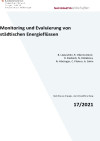
Ausgangsbasis für das Projekt sind die Energiestatistiken. In einem ersten Schritt wird die Erhebungsmethodik im Detail analysiert. Basierend auf den Erkenntnissen der Analyse wird eine Methodik zur Erstellung städtischer Energieflüsse erstellt. Diese wird mithilfe des zu entwickelnden Planungsinstruments "Senflusk" an 5 Referenzstädten getestet.
Schriftenreihe
17/2021
B. Lepuschitz, R. Obernosterer, H. Daxbeck, N. Kisliakova, N. Hörzinger, C. Ploiner, A. Sahin Berichte aus Energie- und Umweltforschung 17/
Herausgeber: BMK
Deutsch, 65 Seiten
Downloads zur Publikation
Sustainable, beautiful and together
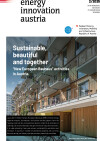
"New European Bauhaus" activities in Austria
energy innovation austria
2/2025
Herausgeber: BMIMI in cooperation with the Climate and Energy Fund
Englisch, 12 Seiten
Downloads zur Publikation
scaleFLEX - Scalable method for optimizing the energy flexibility of districts
Development of a decentrally organized automation method for improving the demand-side flexibility options of buildings and districts. The utilized data-driven algorithm promise high scalability and therefore low installation and operating costs. The developed method will be validated using different building types (high-tech office buildings, low-tech office buildings, residential buildings).
3D*3B - 3D-Betondruck und Bewehrung für emissionsarme biegebeanspruchte Tragstrukturen des Hochbaus
Interdisziplinäres Projekt zur Integration von 3D-Betondruckelementen in vorwiegend biegebeanspruchte Tragstrukturen mit dem Ziel der nachweisbaren Reduktion von klimarelevanten Emissionen im Baubereich. Die Ergebnisse dienen der umfassenden Beurteilung technischer, logistischer und klimarelevanter Aspekte.
Stakeholderprozess der Initiative "Referenzarchitektur für sichere Smart Grids in Österreich"
Das Projekt bereitete die Entwicklung einer Smart Grids Referenzarchitektur für Österreich unter Einbindung aller relevanten Akteure auf. Aus den technisch-wissenschaftlichen Grundlagen wurde ein Prozess erarbeitet, der die Anforderungen vom Infrastrukturbetreiber, der Industrie bis zu Bedarfsträgern abholt und zu einer national akzeptierten und international ausgerichteten Referenzarchitektur abstimmt.
